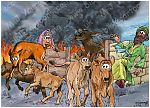Bible Cartoon: Malachi 03 - The day of judgement - Scene 02 - Refiner of silver
Click on Add to cart button below shopping cart.
Purchased Bible Cartoons do not have watermarks. Links to Cartoons provided on email once purchase is completed.Bible Book: Malachi
Bible Book Code: 3900300301
Scene no: 1 of 1
Bible Reference & Cartoon Description
Malachi 3:3-4 (ANIV)
The Day of Judgement (continued)
3 He [the Lord God] will sit as a refiner and purifier of silver; he will purify the Levites and refine them like gold and silver. Then the Lord will have men who will bring offerings in righteousness, 4 and the offerings of Judah and Jerusalem will be acceptable to the Lord, as in days gone by, as in former years.
DRAWING NOTES:
TIME OF DAY:
Not specified in the Bible.
LIGHTING NOTES:
The hot coals in the furnace below the crucible provide the light for this scene.
CHARACTERS PRESENT:
Jesus.
RESEARCH/ADDITIONAL NOTES:
This is a simple scene showing the face of Jesus reflected in the pure silver contained within a crucible over hot coals. A crucible is a metal or ceramic or dish/container in which metals or other substances may be melted or subjected to very high temperatures.
The idea of a silversmith seeing their own reflection in the refined silver is a well-known Christian analogy or parable used to explain the biblical verse Malachi 3:3. However, this illustration is not a direct quote found within the Bible itself, but rather a story that has been widely shared in sermons and Christian literature to help interpret the scriptural concept.
Malachi 3:3, (ANIV) only says “He will sit as a refiner and purifier of silver”. The popular analogy elaborates on the process of refining silver to draw a spiritual parallel. Allegedly a group of women studying the Bible were puzzled by this verse and decided to ask a real silversmith about his work and process of refining silver. The silversmith explained that he had to sit and constantly watch the silver (in a crucible) in the hottest part of the fire, so it wouldn’t be damaged or destroyed. The intense heat of the furnace separated the dross (mineral waste) from the pure silver.
When asked how he knew the silver was fully refined and pure, he replied: “When I can see my own image reflected in it”.
In this widely used parable, the spiritual meaning is that God, the “refiner,” watches over people (the “silver”) during times of trial and affliction (the “furnace”) to burn away impurities or sins. The process is complete when God can see His own image and character reflected in us, signifying a state of purification and transformation into the likeness of Christ.
Although this specific story is an illustrative tradition, it is based on sound biblical concepts of God’s refining process (see Psalm 66:10; Isaiah 48:10; Romans 8:29 [1]). The accuracy of the silversmithing details in the story has been verified by some sources as an accurate description of the traditional process.
[1]
Psalm 66:10 (ANIV)
For you, God, tested us;
you refined us like silver.
Isaiah 48:10 (ANIV)
See, I have refined you, though not as silver;
I have tested you in the furnace of affliction.
Romans 8:29 (ANIV)
29 For those God foreknew he also predestined to be conformed to the image of his Son, that he might be the firstborn among many brothers and sisters.
Bible Doctrine Notes
3:3-4 STEWARDSHIP, Lifestyle (4.51C1)
Father God teaches us and helps us to understand how to worship Him. His goal is to refine and purify us
so that our right living will go hand-in-hand with our offerings. Only as we present ourselves acceptable to God can our offerings also be acceptable to Him. See notes on Micah 6:6-8; Luke 12:16-31.
Luke 12:16-31 says: How we live expresses our Christian faith. Our actions, words, thoughts, use of possessions, etc all illustrates our faith. Typically the world insists that a “good life” consists of the accumulation of material goods and wealth and indulging in luxuries. Jesus taught that a truly happy and good life is expressed only when we seek to extend His kingdom by loving, serving and giving to others. Jesus’ teachings and his corresponding lifestyle denounced getting wealth as the aim of life. He taught that material possessions are temporary while spiritual riches are eternal. Money and possessions are to used rightly in spiritual service.
3:3-4 WORSHIP, Priesthood (5.34B3)
The Lord God looked to the day when priests would be morally pure and faithfully follow the directions He gave them for worship. Our offerings and our behaviour are linked: impure motives and actions make our offerings to God unacceptable.





